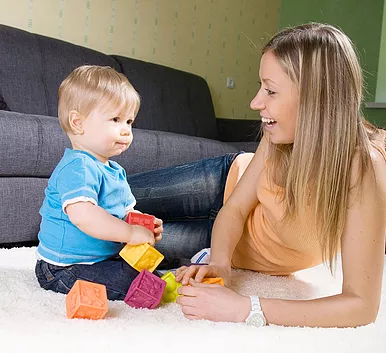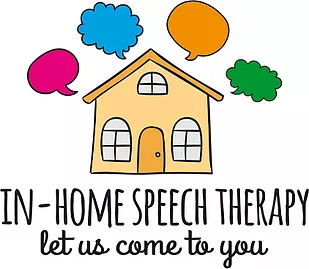
8 Ways to Encourage Language Development in Babies!
As a Speech-Language Pathologist, I typically work with children starting at around 14-18 months. However, here are a few strategies caregivers can implement from birth to help encourage your baby’s language development. Using these simple strategies can make a HUGE impact during the early development period.
1. Imitate! Imitate! Imitate! Imitate everything your baby does, including eye contact, facial expressions, gestures and all of those adorable vocalizations your baby is making.
WHY?
Imitation is one of the most rewarding things you can do with your baby as well as being one of the earliest stages of language development. Imitating things your baby is doing naturally motivates them to continue doing it! Sharing the same focus with your child encourages them to look at you, promotes social skills, helps your child learn to lead and perhaps most importantly, encourages your child to imitate YOU!
2. Reinforce all your baby’s early “communication” attempts by maintaining eye contact, responding with speech and imitating their vocalizations.
WHY?
By responding to your baby’s communication attempts you are actually encouraging them to communicate MORE. Simple as that! At the same time, you are also teaching them basic conversational skills.
3. Encourage your baby to experiment with different sounds including various vowel sounds and early consonant-vowel combinations (e.g. “ma”, “ba” and “da”).
WHY?
Sounds are the building blocks for speech and babies need lots of practice! Encouraging them to make a variety of sounds only helps this process and imitating them actually increases the amount of sounds they make.
4. Vary the pitch of your voice when talking to your baby.
WHY?
Babies respond better and pay more attention to varying pitch. Keeping your baby interested will help them acquire more language. Keep in mind that this “baby” or “caregiver” talk will not hinder your baby’s speech and language development. As babies get older and begin to understand the words that are being said, this variation in pitch is no longer needed to maintain their attention.
5. Sing songs with gestures such as the “Itsy Bitsy Spider” or “Wheels on the Bus.”, or action songs such as “Grand Old Duke of York” or “Humpty Dumpty”
WHY?
Incorporating simple gestures and actions into the songs you sing with your baby increases their interest in them. Additionally, as your baby learns to imitate gestures, it gives them a way to participate with you in the music. Stopping the song and waiting at key moments gives your baby time to react and join in, whether that is by smiling, cooing or making a gesture.
6. Talk! Talk! Talk! Talk to your baby about what you are doing, what they see, where you are going and what you will do when you get there.
WHY?
Babies love to hear us talk! I can’t stress this one enough!! Talking to your baby helps them build their vocabulary and language skills by learning to associate words with meaning. It also helps build memory and nonverbal cognitive skills such as problem solving. Narrating your daily routines also teaches babies what to expect and eventually helps them build trust as well as comforts them in times of distress.
7. “Read” books with your baby.
WHY?
Even if your baby doesn’t understand the words, they will still enjoy looking at the pictures. Reading at an early age will help your baby develop an interest in books, and also builds early literacy skills such as direction of print, how to hold a book and associating words with pictures. Even if you don’t read the story, describing pictures also helps build vocabulary by introducing concepts such as numbers, colors, shapes and animals in an exciting way. Encourage your baby to look, point and answer questions in whatever way they can. You will be so happy to watch your infant developmental milestones be reached and exceeded!
8. Use routines and pausing to teach your baby to take a turn
WHY?
At a very early age, babies start to become aware of the natural rhythm of conversations. That is, first it is your turn, and then it is my turn. They start to recognize the natural pausing in conversations means that it is their turn to “speak”. This happens at a very early age, generally between 4-7 months. You can use this strategy to your advantage by creating predictable routines and singing predictable songs. Once baby is familiar with the routine or song, you pause and allow them to take a “turn”. So how does this look in real life? Maybe one of your predictable routines is whenever you take baby out of their crib you say “Up, Up, Up” as you pick them up and “Down, Down, Down” as you lower them into your arms. Providing you are varying your intonation and using happy facial expressions, this should be an enjoyable routine for your baby. Once baby gets the hang of this routine, you PAUSE after “Up, Up, Up” while baby is in the air. First their turn may be a smile, then a smile and a kick, then laughing, then vocalizing or gesturing and eventually maybe they attempt to say “Down!” You can do this with almost everything you do! It’s easy and takes very little time, and I promise its really powerful!
As always, get in touch if you have any questions or comments. I would LOVE to hear how these strategies are working for you and your baby!


